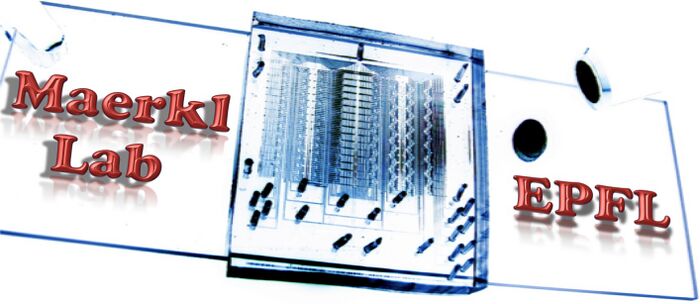Maerkl:Research

Home
Contact
Internal
Lab Members
Publications
Research
Talks
Protocols
Transcription Factor BiophysicsWe have developed novel microfluidic methods for the high-throughput determination of transcription factor characteristics. Using MITOMI we were able to determine the first comprehensive binding energy landscape of any transcription factor, consisting of precise affinity constants for hundreds of DNA sequences. These binding energy landscapes define the physical functionality of a transcription factor and can be used in computational approaches to determine where on a genome a given transcription factor will bind and with what affinity. We furthermore are interested in the underlying molecular contacts between a transcription factor and DNA, which define sequence specificity and affinity. To this end we generated a large library of transcription factor mutants, using a synthetic biology approach, and in conjunction with our high-throughput MITOMI platform were able to determine the sequence specificity of each of the mutants. This in turn allowed us to determine the plasticity of the DNA binding region of our transcription factors, as well as generate a look-up table linking amino acid sequence with DNA sequence specificity for this group of transcription factors. Life Cell ImagingWe are currently developing a high-throughput microfluidic device platform to achieve large-scale single cell imaging covering a large genotypic space while maintaining a high spatio-temporal resolution. With such a platform it will be possible to follow global changes in protein expression dynamics, from which in turn we can determine fundamental parameters governing biological network function. In collaboration with the McKinney lab at EPFL we are also applying a similar approach to a functional genomics screen in M. smegmatis, and possibly M.tubercolosis, to discover genes important in bacterial persistence. Biomolecular InteractionsWe have developed a rapid approach to mapping protein - protein interactions in vitro, by combining a PCR based method for generating linear expression templates, and on-chip transcription/translation of thousands of different proteins. Coupled to MITOMI, a novel method for detecting transient molecular interactions, it will be possible to map protein interaction networks with unprecedented fidelity. We have recently completed a small pilot-scale interaction screen of S.pneumoniae proteins and will extend the application to mapping comprehensive interaction networks. Microfluidic TechnologyThe development of Microfluidic Large-Scale Integration allowed for the robust integration of thousands of functional micro-mechanical elements, including microfluidic valves, on a chip the size of a postage stamp. With such high valve densities of over 700 valves/cm2 it is now possible to perform complicated fluidic manipulations, commonly required in any biological method. We are constantly working on developing the technology as necessitated by more and more complex and large-scale methods required to answer outstanding questions in Systems Biology. |